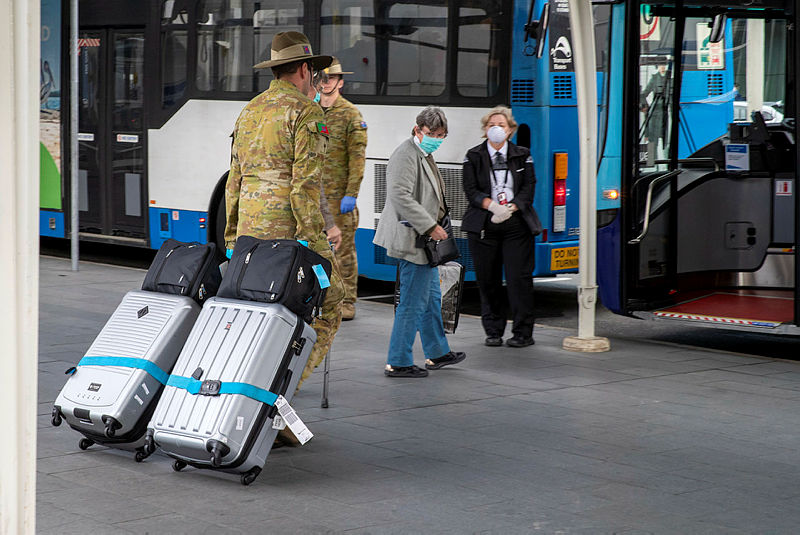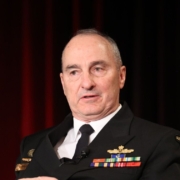ADF’s Covid-19 role must be clearly communicated

Australians returning from overseas are being met with the uncommon sight of Australian Defence Force personnel at our airports. Even though Prime Minister Morrison has said that the ADF is there in support of the police and has no enforcement role, there are nevertheless potential political and security risks associated with the ADF’s involvement in the Covid-19 response.
The ADF was mobilised following a decision by the national cabinet that citizens and residents arriving from overseas would undergo mandatory quarantine at designated facilities. Calling up the ADF to support the states and civilian authorities isn’t a new concept. Just last week, Operation Bushfire Assist concluded, bringing to an end the largest mobilisation of the ADF for domestic disaster relief. As part of that operation, the ADF assisted with logistics and emergency relief and supported recovery efforts in fire-affected communities across the country.
We have seen the same levels of ingenuity and community partnership in the ADF’s response to Covid-19. Parts of that response draw on the military’s engineering, logistics, communications, planning, reconnaissance and medical expertise, lending support to state and territory governments, the private sector and charitable organisations. That type of support is unlikely to cause much controversy. However, the visible deployment of the ADF on the streets, at the doors of people’s homes, at airports and at border crossings, providing support to civilian law enforcement agencies, represents a further step in engagement that presents some likely risks.
Some of these risks were explored during parliament’s recent consideration of amendments made to the Defence Act 1903 following the Lindt café siege in Sydney in 2014. The Defence Amendment (Call Out of the Australian Defence Force) Act 2018 effectively lowered the standards required for the ADF to be called out in an event of ‘domestic violence’. The changes were intended to address potential gaps in initiating and supporting counterterrorist activities by the states.
Although the ADF’s role in the response to Covid-19 isn’t under those powers, the concerns raised by the situation are similar to those raised about the legislation, namely in relation to enforcement activities. Already, across the globe, we are seeing some political leaders use this crisis to try to consolidate power. While Australia’s democratic institutions are relatively robust, public trust can be fickle in a crisis. The functioning of our democratic institutions has already been restricted, with parliament unlikely to resume regular sittings before August. While it appears that the government is consulting closely with the opposition, such a significant shift in the operation of a democratic institution warrants further public debate.
In much the same way, the decision to deploy the ADF in response to the Covid-19 crisis requires clear communication about its expected roles and responsibilities. Efforts to communicate like that by the head of the Covid-19 taskforce, Lieutenant General John Frewen, are a welcome move. Such messages reflect the organisation’s awareness that it must tread carefully when operating in these contexts. However, public information campaigns need to go to the next step and move beyond emotive images of defence ‘answering the call’ and communicate clearly that this is an exceptional and extraordinary role for the ADF.
Pictures convey a thousand words. While photos of ADF personnel carrying bags and engaging with the public may be received positively, military personnel patrolling and door-knocking alongside police may cause confusion and resentment. It only takes one bad encounter or use of force against a member of the public to be captured on a mobile phone and go viral for trust to be severely undermined overnight.
There’s also the question of perception among our regional neighbours. In several countries in the Indo-Pacific, the military has had a role in overthrowing democratically elected governments. This pandemic offers plenty of justification for governments to assume extraordinary powers that they may not relinquish, particularly if they can point to examples of things that Australia has implemented.
Political leaders have been quick to characterise efforts to respond to Covid-19 as a ‘war’ with ‘frontline’ workers. But while that rallying cry might assist in securing resources and public compliance, it’s unlikely to strengthen our democratic institutions. Such analogies may also lull us into thinking that human life, including within the military, is more expendable. It’s a challenge unfolding in the US military, reflected in the words of the former captain of the aircraft carrier USS Theodore Roosevelt, now relieved of his command after his request for assistance with a Covid-19 outbreak on the ship went public. ‘We are not at war. Sailors do not need to die’, he said.
And this highlights another potential risk. The pandemic is exposing vulnerabilities in our national security institutions, particularly the military, which relies on the operational readiness of its personnel. So far, the impact of the virus on the ADF has been somewhat limited, with 30 cases as of 6 April. But that number is likely to increase if members continue serving in roles in which they’re exposed to members of the community who are at high risk of infection.
Decisions to draw on the ADF will need to be continually balanced with potential future tasking of our defence forces. Our strategic security environment is likely to become only more uncertain in the weeks ahead, as some countries seek to exploit the vulnerabilities presented by the pandemic. Furthermore, failure to follow through on our Pacific step-up commitments in this time of real need will not be forgotten by our neighbours.
Our political and military leaders need to make clear that these powers are extraordinary and time-limited to this crisis. While those messages have been there, they haven’t been clear enough for a community that is panicked, anxious and scared.
Yes, we are living in unprecedented times, and unprecedented measures are warranted, but we need to ensure that we don’t undermine our democratic institutions, including the valued trust placed in the ADF by the community, in the process. In that event, the cure may indeed be worse than the disease.

